The artist, poet, filmmaker and musician John Fox died at home at The Beach House, near Ulverston, Cumbria, on March 14.
There will no doubt be obituaries for John, and there are many publications and articles about the work of Welfare State International which he helped to found.
This is neither of these – it’s a personal piece about how John and Sue and their work have impacted on me and my family over the decades, as for so many others.
I first met John Fox and his wife, Sue Gill, in my early 20s when I was studying at Edinburgh University.
I was heavily involved in university drama and we commissioned a lot of new work from British playwrights.
One of these plays featured a character who was a not very expert stripper, and I played this part, receiving some training in comic performance from acclaimed mime artist Lindsey Kemp who at that time lived in the city.
By chance, John or someone else involved with Welfare State (named because they believed the arts should be available in the same way as healthcare) saw the show and asked if I would perform in a surreal variety show called The Sweet Misery of Life.
My involvement with the company started there and university holidays saw me going off to tour with them, sleeping in a circus tent, performing in cities and towns across the country alongside some amazing artists and musicians.
These included Mike Westbrook and Phil Minton, influential figures on the UK jazz scene, and others who went on to form their own companies or take on major roles in the arts, like Steve Gumbley of IOU Theatre, Liz Pugh of Walk the Plank, Peter Stark, who became director of Northern Arts, Pete Moser, who started More Music in Morecambe, and many more.
I was very sad to learn this week that Jamie Proud, one of the original tribe of artists who remained very close to all the Fox family, collaborating with Dan Fox on his sound installations, died just a few days ago.
Pete Moser posted a brilliant video on Facebook with him singing and striking the Morecambe Bay Time and Tide Bell on April 1 (John would have liked the April Fools’ Day connection) in honour of both John and Jamie.
For me, working with Welfare State was a complete contrast to working on scripted plays.
As John, Sue and the many others involved came from a visual arts background, the way shows developed was organic and collaborative, but with John always at the heart of things.
This played a huge part in what I went on to do after university, not seeking work with a major arts organisation but taking up a community arts job in deepest north Devon – and then moving to a similar job in the North East in 1976.
In A Restless Art (Calouste Gulbenkian Foundation, 2019) the brilliant writer and thinker François Matarasso sums up the work of what was eventually renamed Welfare State International (WSI) as it worked extensively abroad as well as in the UK through the last three decades of the 20th Century and into the 21st.
Founded in 1968 Welfare State presented its final show in 2006. In the intervening years this fluid group of artists sought ‘An Alternative, an Entertainment and a Way of Life’. They camped on a rubbish tip in Burnley, toured Britain in caravans, made a film with bikers, raised the Titanic, burned the Houses of Parliament (in effigy) and played at barn dances, giving audiences groundbreaking unforgettable experiences. Their poetic art was anarchic and political, with a passion for nature ahead of its time. It mined music hall and mystery plays, ritual and circus, popular culture and the avant-garde to create an aesthetic repertoire that electrified community art for two generations.
I didn't perform with Welfare State much after university - apart from a very different project commissioned by the Serpentine Gallery, where I played an ancient female gardener (fully dressed this time) - but I did keep in touch and saw many of their various productions, large and small.
John was a force to be reckoned with, particularly when faced with inconvenient bureaucracy.
I have a vivid memory of him arguing with someone from Bradford Council about the safety of the circus seating as it was being set up in Bradford Wool Exchange.
John won the day although one bank of seating did partially collapse during the show. Fortunately no-one was hurt.
(Incidentally, whoever might think Bradford was a cultural desert until UK City of Culture would be wrong - it was a hotbed of activity in theatre and the arts in the 1970s and ’80s and Welfare State actually started there when John was tutor librarian at Bradford School of Art.)
I visited after they moved their operation from Leeds to Burnley and then to Ulverston, where in 1983 they started the now famous lantern parade, creating lanterns made out of willow and tissue paper and containing real candles.
It continues to this day and has spawned many other such parades across the country and beyond.
My husband, the writer Graeme Rigby, and I took our then young children, Sam (two) and Annie (four), to the Ulverston parade and to see Tales for England in 1984 and we remember Sam asking: “Why is the music so beautiful?”
As a member of the Northern Arts board in the 1990s and when running folk development organisation Folkworks, I visited the Lanternhouse, the building created in Ulverston to house Welfare State’s whole operation and to provide a base for courses sharing their ways of working.
Somehow it wasn’t a surprise, though, when John stepped down as artistic director of the Lanternhouse in 2006 and created the final act of WSI with Longline - a Carnival Opera.
As I know from my own work, running a cultural building brings with it a whole set of other agendas!
From this death arose the company Dead Good Guides – ‘an artist led company seeking a role for art that weaves it more fully into the fabric of our lives’ (deadgoodguides.co.uk).
Building a new home and a place to create in The Beach House, on the shore of Morecambe Bay, saw John and Sue further developing their Rites of Passage programme, bringing creativity, practicality and imagination to secular ceremonies and particularly to the whole business of dealing with death.
The Beach House, and the Wildernest next to it, became the creative base for many more projects, events, courses and publications, as well as a haven.
As Sue says in her wonderful book In all my born days (available from deadgoodguides.co.uk): “The Beach House is not a house, it’s an Ark into which I have loaded everything. Everything I love.”
The book gives fascinating insight into Sue’s childhood but also about bringing up a family whilst living a hugely creative, and for 10 years a nomadic, life with Welfare State.
It also contains some surprises.
Although she did go to art college, Sue didn’t come from a family interested in the arts. Her great grandfather was a North Sea fisherman and she was brought up largely by tough northern women whose men were away at the war or had died in it.
Another surprise is that she didn’t meet John at art college. They met much earlier, as teenagers, when John used to engineer bumping into her, aged 15, when they were each biking home from their respective schools.
Their first proper date was at Hull Fair and the relationship continued from then until this John’s death, well over 60 years of living and working together, producing astounding work and two very talented children, Dan and Hannah, who now have their own children and careers as artists.
John could not have been John without Sue.
I remember preparing for The Sweet Misery of Life in the circus tent and seeing Sue efficiently putting their children to bed, in whatever vehicle they were living in at the time, before going on to perform herself.
That doesn’t mean they adopted conventional gender roles - Sue can drive heavy goods vehicles – but they were a team of two whose creativity was inextricably connected.
Graeme and I had John and Sue as friends for decades. They stayed in our house and we with them.
We made a visit in 2019 to the Beach House where, as always, they made us hugely welcome, and knowing Graeme’s fascination with fish, and particularly herring, John cooked him a breakfast of herring roe.
We also picked samphire in the Wildernest for our evening meal.
John was the most attentive and generous of hosts. One always felt like an honoured guest and this will have been true for hundreds of John and Sue’s friends.
He was also an extremely funny man and the least pompous, given his achievements. We were very sad that this turned out to be our last visit.
Last summer we received a book from John called Rehearsing a Future which contains these words: “Following a diagnosis of terminal cancer in January 2024 I decided initially to keep quiet about it. I have now decided to share the news by sending this booklet of five new poems and an essay to a hundred friends and colleagues.”
We were honoured to be among them.
The booklet describes some of the administrative challenges involved in sorting things out – dealing with the bank without a smartphone, finding a marriage certificate, writing requests in a will, deciding between burial and cremation. Alongside these are thoughts about how to prepare grandchildren for what may be a difficult future, extracts from other poets and writers on the subject of death, including some very funny ones, followed by some lovely and moving poems and ending with one celebrating an occasion when he and Sue were watering some cardoon plants (a kind of artichoke) near their house and having a laugh doing it. It concludes:
Everybody goes WOW,
Here’s joy, Here.
NOW.
Watering the Cardoons.
John was a very kind man and sharing the news about his illness and sending friends this book was such a generous thing to do. We hope they had more moments like the one with the cardoons.
So, back to our own family and the impact of John’s work. Our daughter, Annie Rigby, who founded Unfolding Theatre in Newcastle, wrote this when she heard of John’s death:
I was taken to Welfare State International shows and lantern parades by my parents when I was very little. Years later I went to see their last show, Longline, in Ulverston. I remember having this weird deep recognition. Thinking about my own work and sitting there seeing the roots of it in front of me. Community, folk tales, people, ritual, connection. Sending love to John’s family and friends (not least my own parents).
And feeling grateful for all those lantern parades that lit a light in me.
And so they have in so many others, and through Sue, Dan and Hannah will continue to do so.
Ros Rigby. April 2, 2025.


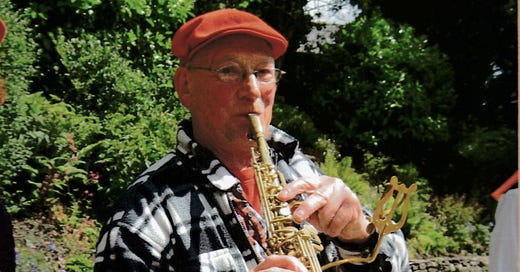


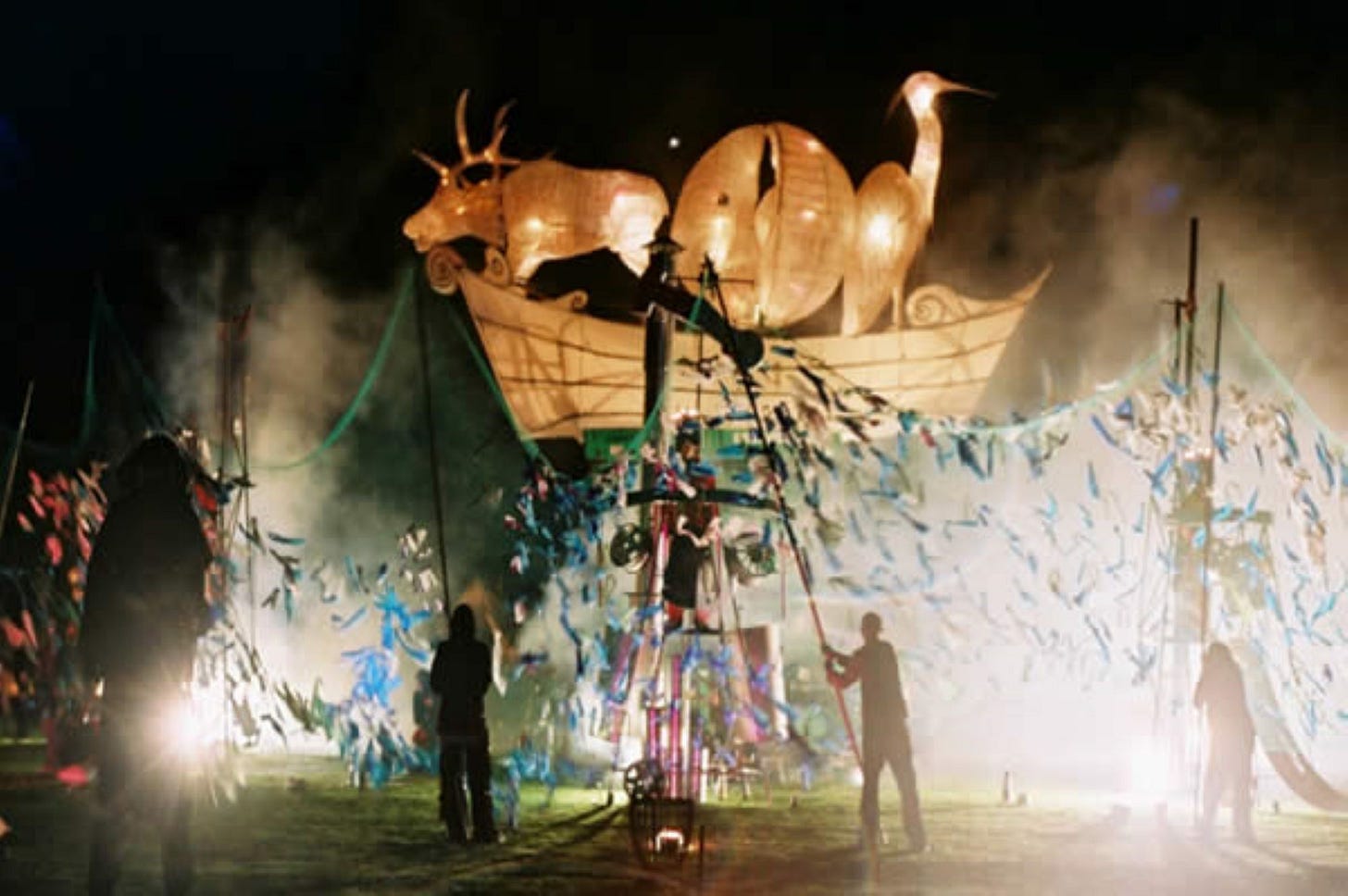
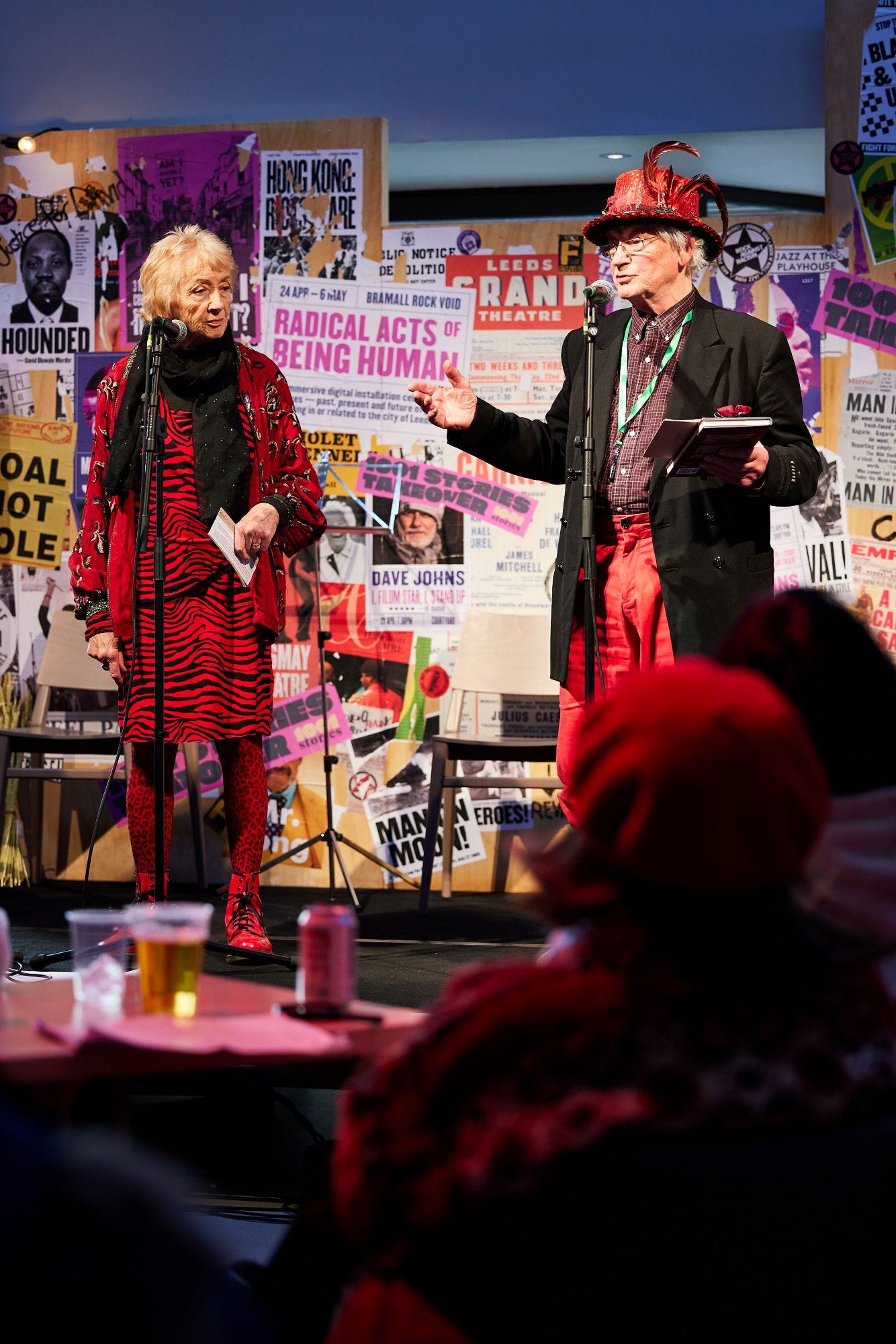
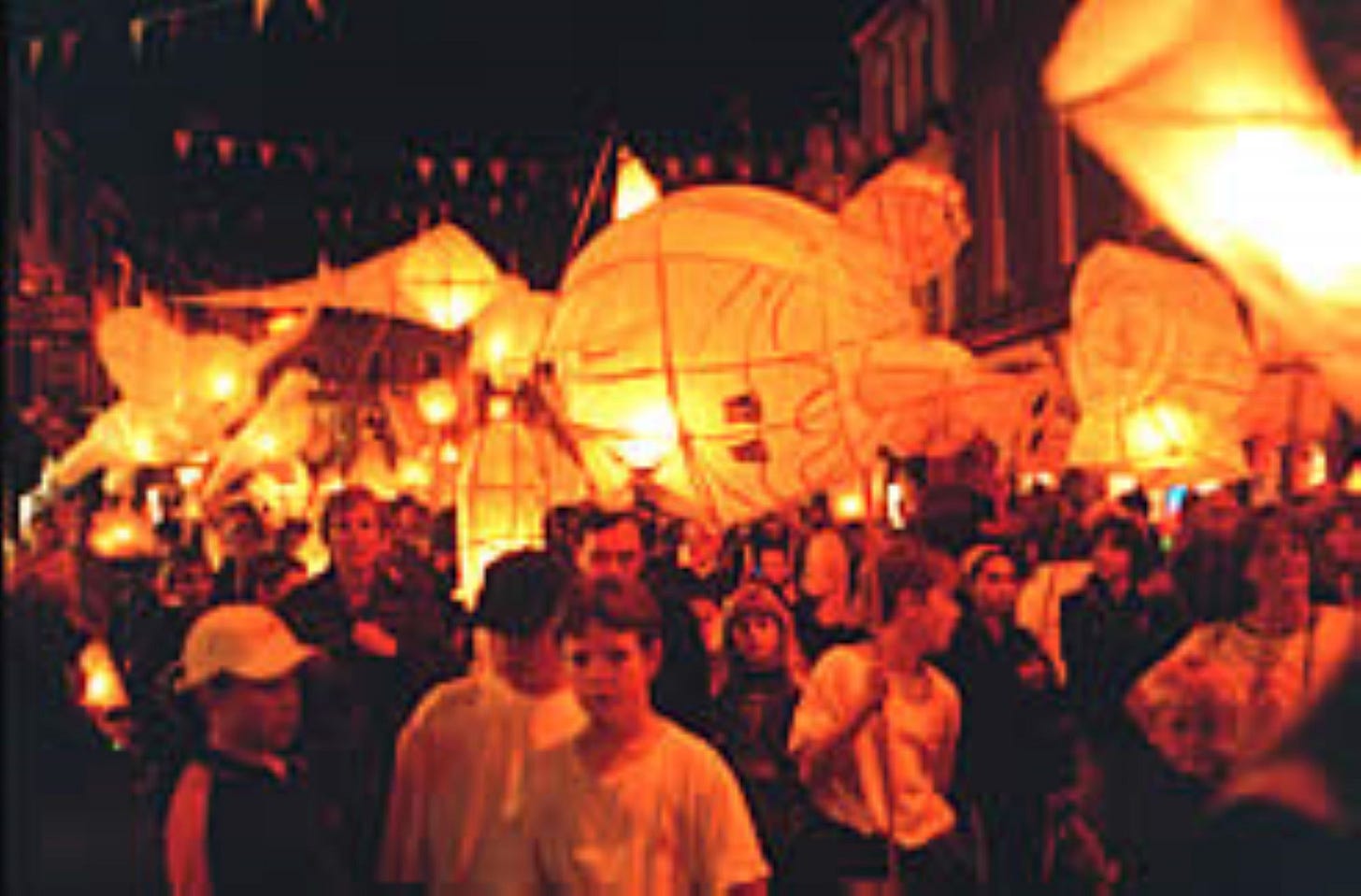
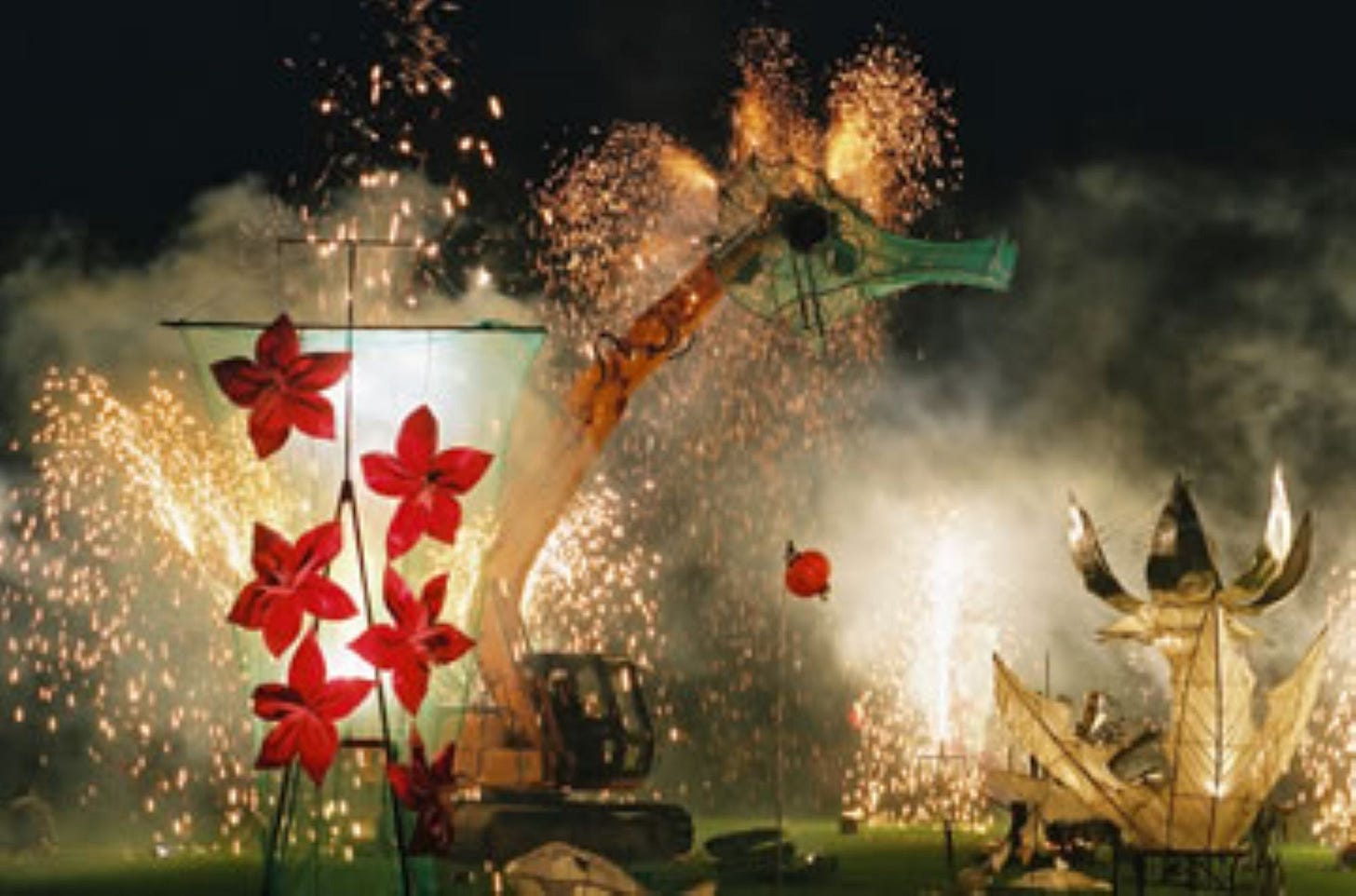
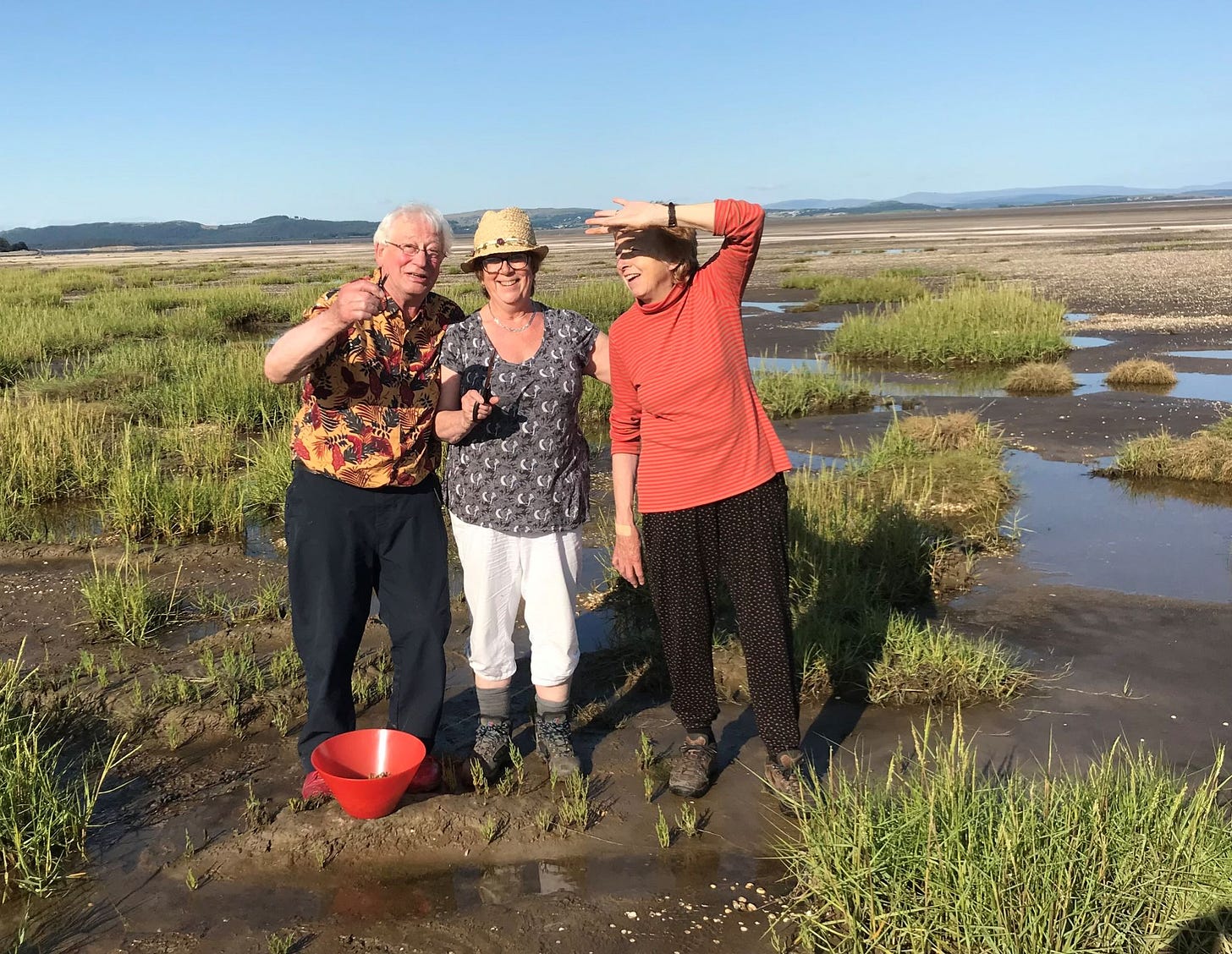
I’m brought to tears by this … god, all those stories. I saw this guy speak once and it has stuck with me. Working with eea was the best years of my life. God bless welfare state. Forever sticking a finger to the corporates
Wonderful tribute Ros.